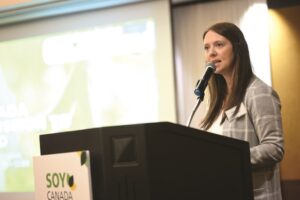From Ontario to the world
AARON BREIMER’S JOURNEY TO INTERNATIONAL CERTIFIED CROP ADVISOR LEADERSHIP

AARON BREIMER, PRINCIPAL AT MOOSE- AG, A HIGH-DEFINITION TOPSOIL MAPPING SERVICE, is the current chair of the Ontario Certified Crop Advisor (CCA) Board and has recently been elected the incoming vice- chair for the International CCA (ICCA) Board. In a recent conversation, he shared insights into his career, the significance of the CCA program, and his aspirations for the future of the agricultural industry.
GROWING UP ON THE FARM
Breimer grew up on a farm around Middlesex County’s Ailsa Craig area and was interested in plants and crops from a young age. He completed a Bachelor of Science in Agriculture at the University of Guelph, during which he spent a semester on an exchange program in New Zealand. Their scientific approach to soil studies spurred his interest in soil chemistry. In 2001, he started his career in agriculture retail in Chatham and gained his CCA designation in 2003.
In the mid-2010s, Breimer had the opportunity to go to Zambia to practice agronomy in sub-Saharan Africa for a couple of weeks. “It was a pretty cool experience that really changed my outlook on what I could do, what agronomists and agronomy could do to make the world a better place,” he says. After presenting about this experience at the annual Ontario CCA conference, he decided to run for the Ontario CCA Board. After a few years, he was asked to sit on the Executive Board – a six-year commitment with two-year terms spent as incoming vice chair, chair, and past chair. His upcoming term with the ICCA board will be a three-year term following a similar pattern.
THE CCA PROGRAM
The CCA designation, established in 1992 by the American Society of Agronomy, began as a benchmark for agronomy professionals in the U.S. and Canada and has since expanded to Mexico and outside of North America. Ontario adopted the program in 1996, requiring both an international and local exam. The latter is specific to the local board – there are 33 boards in total, three of which are in Canada. Aaron noted that only 25 – 40 per cent of test takers pass the exam, speaking to the program’s high standards. CCAs are also required to have appropriate education and experience before being designated.
According to Breimer, the CCA certification is unique for its code of ethics and continued professional education (CPE). While many mandatory professional registrations include these aspects, the CCA designation is voluntary, signalling to farmers that these agronomists are committed to providing recommendations grounded in the latest agronomic research and delivered with integrity. The CCA program emphasizes education in integrated pest management, crop management, soil and water management, and nutrient management. Breimer also highlights the importance of science in agronomy and the value it creates for farmers.
Of the approximately 12,000 international CCAs, 669 are in Ontario. Nutrient management, one of six program specializations, has an especially big focus among Ontario CCAs, with approximately 20 per cent of CCAs with this specialization in Ontario. Aaron linked this to Ontarians’ concerns for lake water quality – being both an avid shipwreck scuba diver and reliant on water from Lake Erie, he has firsthand experience with just how important it is to reduce impacts on water quality.
Local CCA boards, as grassroots organizations, develop and update exam questions, collect fees, manage ethics violations, approve applications and CPEs, and host an annual conference. The ICCA board focuses on overarching policies, supports local boards, and promotes communication within the agriculture industry. Aaron stresses the importance of networking and collaboration, especially at the local level, adding that collaboration is his biggest passion. “Collaboration is when you work together to achieve both your and the other person’s individual goals, but there’s some higher goal that benefits both of you as well as those around you. That’s collaboration.”
INTERNATIONAL ACCLAIM
Aaron is only the third Canadian and the second Ontarian to serve on the ICCA board. Reflecting on this achievement, he expressed how humbling it is for a “farm kid and agronomy nerd” to interact with some of the smartest and best agronomists across North America and around the world. He emphasizes his love for networking and acknowledges that many of the opportunities he’s had would not have been possible without the connections he’s made. He is also grateful to be able to give back to the industry that shaped his career.
“On behalf of the Ontario CCA Board of Directors, I had the pleasure of nominating Aaron for the position of Vice Chair of the ICCA Board. I am very pleased he was elected. Aaron has been a passionate and valuable member of our Board, and we know he will take that same enthusiasm to the International CCA Board,” says Nicole Penney, the incoming Ontario CCA Board chair.
Aaron is particularly excited to host the annual general meeting in Ontario in 2026 – a perk of being the ICCA chair – where CCAs from around the world will have the opportunity to see and experience Ontario’s agricultural landscape. He’s also looking forward to showcasing the successes of the Ontario CCA Board in building and maintaining the organization’s strength and brand.
THE FUTURE OF CCA
As Aaron prepares for his position on the ICCA board, his biggest piece of advice to CCAs and those entering agronomy is to approach the industry with a learner’s mindset and to know that “you will always be the student of agronomy.” He adds that this desire to learn is crucial to creating value for both farmers and employers.
Aaron’s dedication to the field is clear, and as he looks forward to what lies ahead both in Ontario and on the international stage, we wish him all the best with his journey and look forward to following his progress. •



























